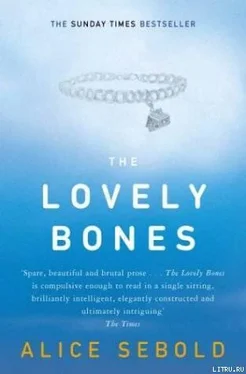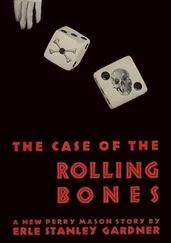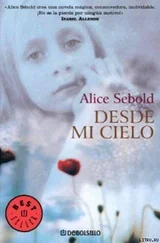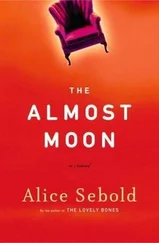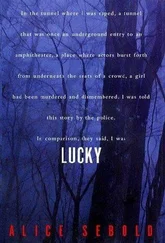She couldn’t stop the memories slamming into her. Every one had a brutal report. Buckley riding piggyback on my shoulders down the stairs. Our mother steadying me as Lindsey looked on, jealous that I could reach, with the silver star in my hands, the top of the Christmas tree. Me sliding down the banister and asking her to join. Both of us begging the comics off our father after dinner. All of us running after Holiday as he barked and barked. And the countless exhausted smiles awkwardly dressing our faces for photos at birthdays, and holidays, and after school. Two sisters dressed identically in velvet or plaid or Easter yellows. We held baskets of bunnies and eggs we had sunk in dye. Patent leather shoes with straps and hard buckles. Smiling hard as our mother tried to focus her camera. The photos always fuzzy, our eyes bright red spots. None of them, these artifacts left to my sister, would hold for posterity the moments before and the moments after, when we two girls played in the house or fought over toys. When we were sisters.
Then she saw it. My back darting into the next room. Our dining room, the room that held his finished dollhouses. I was a child running just ahead of her.
She hurried after me.
She chased me through the downstairs rooms and though she was training hard for soccer, when she returned to the front hall she was unable to catch her breath. She grew dizzy.
I thought of what my mother had always said about a boy at our bus stop who was twice as old as us but still in the second grade. “He doesn’t know his own strength, so you need to be careful around him.” He liked to give bear hugs to anyone who was nice to him, and you could see this dopey love drop into his features and ignite his desire to touch. Before he was removed from regular school and sent somewhere else no one talked about, he had picked up a little girl named Daphne and squeezed her so hard that she fell into the road when he let go. I was pushing so hard on the Inbetween to get to Lindsey that I suddenly felt I might hurt her when I meant to help.
My sister sat down on the wide steps at the bottom of the front hall and closed her eyes, focused on regaining her breath, on why she was in Mr. Harvey’s house in the first place. She felt encased in something heavy, a fly trapped in a spider’s funnel web, the thick silk binding up around her. She knew that our father had walked into the cornfield possessed by something that was creeping into her now. She had wanted to bring back clues he could use as rungs to climb back to her on, to anchor him with facts, to ballast his sentences to Len. Instead she saw herself falling after him into a bottomless pit.
She had twenty minutes.
Inside that house my sister was the only living being, but she was not alone, and I was not her only company. The architecture of my murderer’s life, the bodies of the girls he’d left behind, began to reveal itself to me now that my sister was in that house. I stood in heaven. I called their names:
Jackie Meyer. Delaware, 1967. Thirteen.
A chair knocked over, its underside facing the room. Lying curled toward it, she wore a striped T-shirt and nothing else. Near her head, a small pool of blood.
Flora Hernandez. Delaware, 1963. Eight.
He’d only wanted to touch her, but she screamed. A small girl for her age. Her left sock and shoe were found later. The body, unrecovered. The bones lay in the earthen basement of an old apartment house.
Leah Fox. Delaware, 1969. Twelve.
On a slipcovered couch under a highway on-ramp, he killed her, very quietly. He fell asleep on top of her, lulled by the sound of cars rushing above them. Not until ten hours later, when a vagrant knocked on the small shack Mr. Harvey had built out of discarded doors – did he begin to pack himself and Leah Fox’s body up.
Sophie Cichetti, Pennsylvania, 1960. Forty-nine.
A landlady, she had divided her upstairs apartment into two by erecting a Sheetrock wall. He liked the half-circle window this created, and the rent was cheap. But she talked too much about her son and insisted on reading him poems from a book of sonnets. He made love to her on her side of the divided room, smashed her skull in when she started to talk, and brought her body to the bank of a creek nearby.
Leidia Johnson. 1960. Six.
Buck’s County, Pennsylvania. He dug an arched cave inside a hill near the quarry and waited. She was the youngest one.
Wendy Richter. Connecticut, 1971. Thirteen.
She was waiting for her father outside a bar. He raped her in the bushes and then strangled her. That time, as he grew conscious, coming up out of the stupor that often clung on, he heard noises. He turned the dead girl’s face toward his, and as the voices grew closer he bit down on her ear. “Sorry, man,” he heard two drunk men say as they walked into the nearby bushes to take a leak.
I saw now that town of floating graves, cold and whipped by winds, where the victims of murder went in the minds of the living. I could see his other victims as they occupied his house – those trace memories left behind before they fled this earth – but I let them go that day and went to my sister.
Lindsey stood up the moment I focused back on her. Together the two of us walked the stairs. She felt like the zombies in the movies Samuel and Hal loved. One foot in front of the other and staring blankly straight ahead. She reached what was my parents’ bedroom in our house and found nothing. She circled the hallway upstairs. Nothing. Then she went into what had been my bedroom in our house, and she found my killer’s.
It was the least barren room in the house, and she did her best not to displace anything. To move her hand in between the sweaters stacked on the shelf, prepared to find anything in their warm insides – a knife, a gun, a Bic pen chewed on by Holiday. Nothing. But then, as she heard something but could not identify what it was, she turned toward the bed and saw the bedside table and, lying in the circle of light from a reading lamp left on, his sketchbook. She walked toward it and heard another sound, again, not putting the sounds together. Car pulling up. Car braking with a squeak. Car door slamming shut.
She turned the pages of the sketchbook and looked at the inky drawings of crossbeams and braces or turrets and buttresses, and she saw the measurements and notes, none of which meant anything to her. Then, as she flipped a final page, she thought she heard footsteps outside and very close.
As Mr. Harvey turned the key in the lock of his front door, she saw the light pencil sketch on the page in front of her. It was a small drawing of stalks above a sunken hole, a detail off to the side of a shelf and how a chimney could draw out smoke from a fire, and the thing that sunk into her: in a spidery hand he had written “Stolfuz cornfield.” If it were not for the articles in the paper after the discovery of my elbow, she would not have known that the cornfield was owned by a man named Stolfuz. Now she saw what I wanted her to know. I had died inside that hole; I had screamed and fought and lost.
She ripped out the page. Mr. Harvey was in the kitchen making something to eat – the liverwurst he favored, a bowl of sweet green grapes. He heard a board creak. He stiffened. He heard another and his back rose and blossomed with sudden understanding.
The grapes dropped on the floor to be crushed by his left foot, while my sister in the room above sprang to the aluminum blinds and unlocked the stubborn window. Mr. Harvey mounted the stairs two at a time, and my sister smashed out the screen, scrambling onto the porch roof and rolling down it as he gained the upstairs hall and came barreling toward her. The gutter broke when her body tipped past it. As he reached his bedroom, she fell into the bushes and brambles and muck.
Читать дальше
